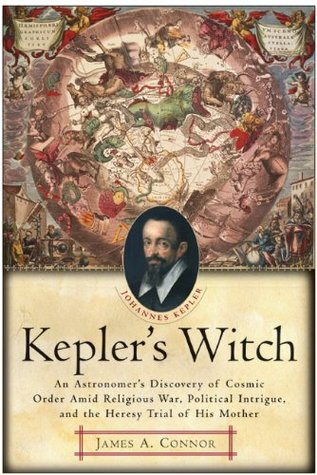This week I'm reading a biography of astronomer Johannes Kepler, who actually isn't terribly well known despite his contributions to mathematics and astronomy. In the introduction Connor makes a point that Kepler has largely been overshadowed by figures such as Copernicus, Galileo, and Newton. Connor points out that while Galileo is held up as a prime example of scientists being persecuted by religion, Kelper was also persecuted for his religious beliefs. Furthermore, while Kepler did not fully create the laws of gravity and integral calculus which are among Newton's chief achievements, he did much of the necessary intellectual groundwork which allowed Newton to create his own work. Not to mention Kepler's contributions to the fields of optics. Connor's hypothesis is that Kepler is simply too mystical a figure, bridging both the medieval and modern worlds, trying to find the mind of god within the workings of the natural world. Connor argues that while Newton had his own mystical streak, he kept it isolated from his scientific research. Kepler, on the other hand, saw no division and freely mixed science and mysticism making him, at least to Connor's understanding, less palatable to modern audiences. Regardless of his mystical proclivities, Kepler is an excellent example of how science is largely an incremental affair with multiple people making gradual progress over time, rather than single individuals making great, intuitive leaps.
The book omits almost all of Kepler's scientific achievements, instead choosing to focus on Kepler's life outside of science. I actually kind of regretted this decision because I don't know much about Kepler's scientific achievements and I really wished they'd been included. The author did include some suggested readings for more information about Kepler's science but it makes the book feel incomplete in a way. The title comes from the fact Kepler's own mother was accused of witchcraft and actually put on trial at the same time Kepler was imperial mathematician. Connor believes this makes a perfect example of many ways how Kepler's life serves as a bridge between the medieval and modern worlds.
So what is the portrait of Kepler that emerges? Connor makes extensive use of Kepler's journals and correspondence to provide information about his life and the image is rather admirable. Kepler, based on Connor's account anyway, is a fairly moderate man who was not very dogmatic in matters of religion. Kepler believed in the supremacy of the personal conscience, as well as the brotherhood of all Christians. This attitude would get him excommunicated from his own Lutheran faith, which he remained faithful to for the rest of his life, and would keep him away from the Catholic church as well. Despite repeated attempts by Jesuits to convert him and the numerous career advantages he might have gained by converting. Kepler appears not overly concerned with fine points of theological doctrine, instead content to measure the stars and calculate the orbits of the planets for the greater glory of god.
If Kepler has any faults, it is his dogmatic belief in Platonic ideals, believing that there are certain geometric shapes in nature which are inherently perfect, and therefore beautiful, and therefore god would use them to build the universe. This sort of mysticism comes up from time to time in Kepler's work, although it's hard to say how much so and Connor tends to downplay it. Connor also makes strong emphasis of the fact that while Kepler did practice astrology, like virtually every other astronomer at the time period, he did not buy terribly much into it and often said the stars would not reveal detailed information about the future, instead general trends or characteristics and the mind of god. And there seems to be enough evidence to suggest Kepler took a half-hearted approach to astrology at best.
I am sort of split on the inclusion of context within the narrative of Kepler's life. The very last years of Kepler's life were embroiled in the first parts of the Thirty Years War, one of Europe's last big religious wars, and Connor goes into some detail about the political machinations behind the war as well as the opening battles. Connor also talks about important figures such as Emperor Rudolf II who first gave Kepler his position as Imperial Mathematician. I'm at a bit of a disadvantage because I know some of this contextual information from studying this period before, an advantage not all other readers would have. But there is some information that feels blatantly like padding, such as the myth about the founding of the city of Prague, which is put in just because there wasn't enough information about Kepler. I feel that including Kepler's scientific work might have been better included.
Overall it's an interesting book and Kepler comes across as an interesting, if underappreciated figure who helped make advances in the Scientific Revolution. The book gets very sidetracked at times, something I kind of wish it hadn't, but the inclusion of primary sources is appreciated. I do have some reservations, wondering if Kepler was cleaned up for more modern, secular audiences, but without more reading I can't say for certain.
- Kalpar


No comments:
Post a Comment